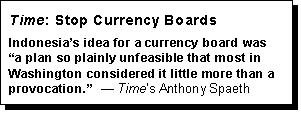 |
|||||||||
|
 |
||
|
 |
||||||||||||||||||||||||
|
||||||||||||||||||||||||
 |
||||||
|
||||||
 |
||||||
|
 |
||||||||||||||||||
|
||||||||||||||||||
 |
||||||||||||||||||||||||
|
||||||||||||||||||||||||
 |
||||||||||||||||||
|
||||||||||||||||||
|
|
|
Thursday, September 3, 1998 - Vol. Two, No. 36 - Media Inquiries: Keith Appell (703) 683-5004

Networks and News Magazines Ignore Charges That Agency Has Worsened Problems Overseas IMF: Immune from Media Fire In most of the reporting recently on the economic troubles worldwide, something has been missing, namely any hint that there are economists who believe the International Monetary Fund (IMF) has made matters in Asia and Russia worse.
But is it just timing? Some economists argue that the IMF has prescribed economic poison, opposed positive changes, and brought about severe unintended consequences. For instance: Currency Devaluations and Tax Increases. The IMF has encouraged countries like South Korea, Thailand, Malaysia, and Indonesia to devalue their currencies and adopt a floating exchange rate, in the hope that this would lead to export-led growth, as well as raise taxes, in the hope of balancing budgets. "But emerging nation currencies don't float, they sink," according to economist Lawrence Kudlow, in the August 31 Washington Times. "And then comes deep recession and hyperinflation." Another problem, critics claim, is that this has led to "competitive devaluations" as neighboring countries devalue out of fear of losing markets. While the networks and news magazines regularly present evidence of the chaotic effects of currency devaluations, they haven't yet implicated the IMF. Currency Boards. Many economists are also critical of the Clinton administration's and the IMF's fierce opposition to Indonesia's plan earlier this year to establish a currency board. Under such a plan, Indonesia would have by law fixed its rupiah to the U.S. dollar, backed up by 100 percent reserves. Many in the press joined in the IMF's denunciations of the currency-board idea. On April 20, Time's Anthony Spaeth denounced it as "a plan so plainly unfeasible that most in Washington considered it little more than a provocation." But as the currency problems in Asia and Russia continue, reporters haven't decided to question the IMF's opposition to currency boards. The networks have ignored talk of the concept, and a Nexis search of Newsweek, Time, and U.S. News & World Report could find only one reference to currency boards during this summer: a brief mention in the August 24 Time that currency speculator George Soros had recommended one for Russia. Moral Hazard. By bailing out bad investments, critics argue, the IMF merely emboldens investors to ignore risks in the future. Economists call this concept "moral hazard." A September 2 Wall Street Journal editorial, for instance, argues that after the generous IMF bailout in Mexico, the "lesson the markets had to draw was: Whee! Cross-border loans are a one-way bet. Throw money at the world. Russia, even." A Nexis search indicates that the words "moral hazard" in relation to the IMF haven't appeared in Newsweek, Time, or U.S. News & World Report all summer. As renewed IMF funding becomes a topic of debate on Capitol Hill this fall, will reporters continue to ignore its conservative critics? -- Tim Lamer

Home | News Division
| Bozell Columns | CyberAlerts |







 Most
stories simply ignore the role the IMF has played in the problems overseas, but even when
stories acknowledge criticism, it isn't the criticism coming from conservatives. An
example: Adam Zagorin in the August 31 Time. According to Zagorin, "Instead
of simply delivering needed money, the fund has also been delivering ultimatums."
While these changes may be necessary, "the focus on sudden change instead of relief
has left many nations twisting in knots trying to solve problems quickly that should
require years of patient work."
Most
stories simply ignore the role the IMF has played in the problems overseas, but even when
stories acknowledge criticism, it isn't the criticism coming from conservatives. An
example: Adam Zagorin in the August 31 Time. According to Zagorin, "Instead
of simply delivering needed money, the fund has also been delivering ultimatums."
While these changes may be necessary, "the focus on sudden change instead of relief
has left many nations twisting in knots trying to solve problems quickly that should
require years of patient work."